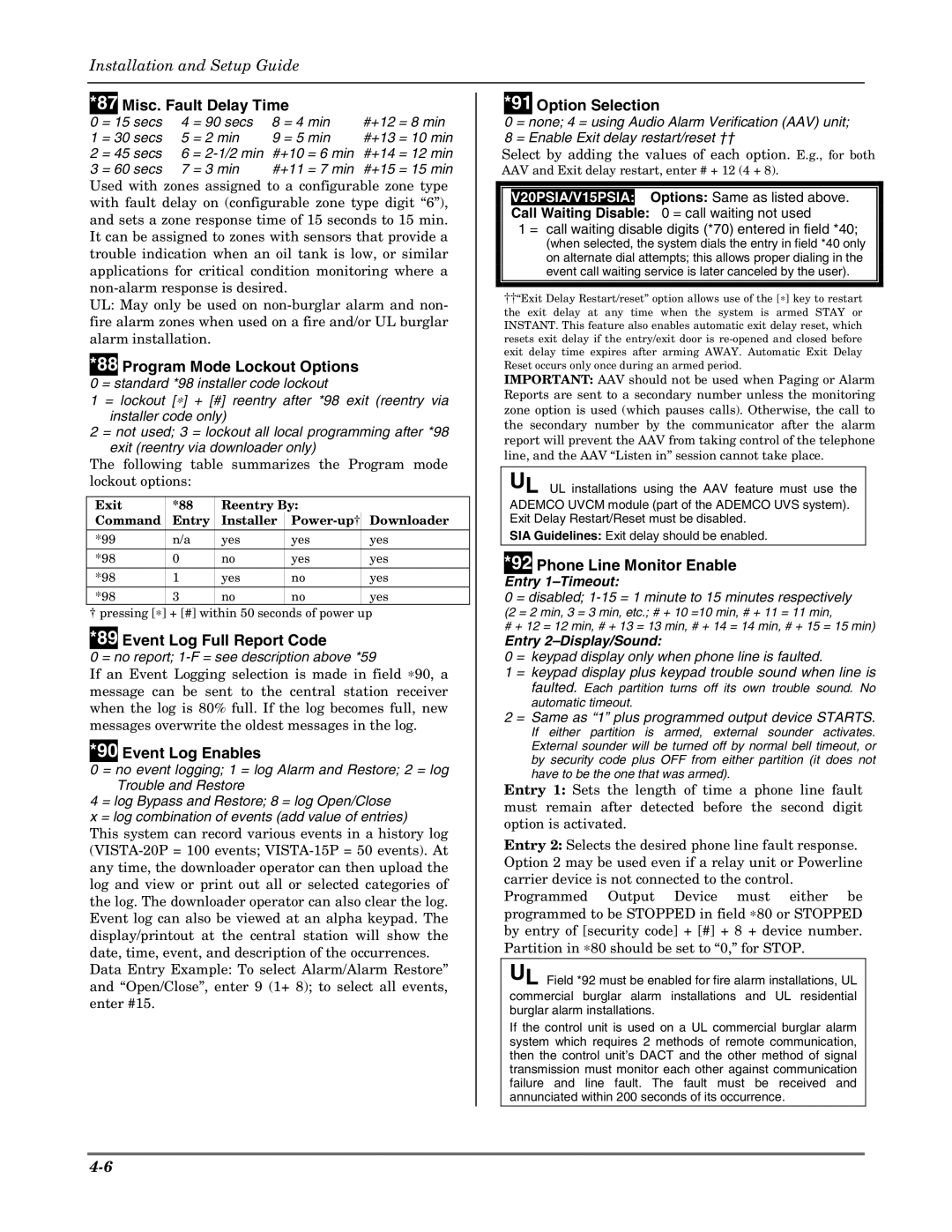
Installation and Setup Guide
*87 Misc. Fault Delay Time
0 = 15 secs | 4 | = 90 secs | 8 = 4 min | #+12 = 8 min |
1 = 30 secs | 5 | = 2 min | 9 = 5 min | #+13 = 10 min |
2 = 45 secs | 6 | = | #+10 = 6 min | #+14 = 12 min |
3 = 60 secs | 7 | = 3 min | #+11 = 7 min | #+15 = 15 min |
Used with zones assigned to a configurable zone type with fault delay on (configurable zone type digit “6”), and sets a zone response time of 15 seconds to 15 min. It can be assigned to zones with sensors that provide a trouble indication when an oil tank is low, or similar applications for critical condition monitoring where a
UL: May only be used on
*88 Program Mode Lockout Options
0 = standard *98 installer code lockout
1 = lockout [∗] + [#] reentry after *98 exit (reentry via installer code only)
2 = not used; 3 = lockout all local programming after *98 exit (reentry via downloader only)
The following table summarizes the Program mode lockout options:
Exit | *88 | Reentry By: |
| |
Command | Entry | Installer | Downloader | |
|
|
|
|
|
*99 | n/a | yes | yes | yes |
*98 | 0 | no | yes | yes |
|
|
|
|
|
*98 | 1 | yes | no | yes |
|
|
|
|
|
*98 | 3 | no | no | yes |
†pressing [∗] + [#] within 50 seconds of power up
*89 Event Log Full Report Code
0 = no report;
If an Event Logging selection is made in field ∗90, a message can be sent to the central station receiver when the log is 80% full. If the log becomes full, new messages overwrite the oldest messages in the log.
*90 Event Log Enables
0 = no event logging; 1 = log Alarm and Restore; 2 = log Trouble and Restore
4 = log Bypass and Restore; 8 = log Open/Close
x = log combination of events (add value of entries)
This system can record various events in a history log
Data Entry Example: To select Alarm/Alarm Restore” and “Open/Close”, enter 9 (1+ 8); to select all events, enter #15.
*91 Option Selection
0 = none; 4 = using Audio Alarm Verification (AAV) unit; 8 = Enable Exit delay restart/reset ††
Select by adding the values of each option. E.g., for both
AAV and Exit delay restart, enter # + 12 (4 + 8).
V20PSIA/V15PSIA: Options: Same as listed above.
Call Waiting Disable: 0 = call waiting not used
1 = call waiting disable digits (*70) entered in field *40;
(when selected, the system dials the entry in field *40 only on alternate dial attempts; this allows proper dialing in the event call waiting service is later canceled by the user).
††“Exit Delay Restart/reset” option allows use of the [∗] key to restart the exit delay at any time when the system is armed STAY or INSTANT. This feature also enables automatic exit delay reset, which resets exit delay if the entry/exit door is
IMPORTANT: AAV should not be used when Paging or Alarm Reports are sent to a secondary number unless the monitoring zone option is used (which pauses calls). Otherwise, the call to the secondary number by the communicator after the alarm report will prevent the AAV from taking control of the telephone line, and the AAV “Listen in” session cannot take place.
UL UL installations using the AAV feature must use the ADEMCO UVCM module (part of the ADEMCO UVS system). Exit Delay Restart/Reset must be disabled.
SIA Guidelines: Exit delay should be enabled.
*92 Phone Line Monitor Enable
Entry 1–Timeout:
0 = disabled; 1-15 = 1 minute to 15 minutes respectively
(2 = 2 min, 3 = 3 min, etc.; # + 10 =10 min, # + 11 = 11 min,
#+ 12 = 12 min, # + 13 = 13 min, # + 14 = 14 min, # + 15 = 15 min)
Entry 2–Display/Sound:
0 = keypad display only when phone line is faulted.
1 = keypad display plus keypad trouble sound when line is faulted. Each partition turns off its own trouble sound. No automatic timeout.
2 = Same as “1” plus programmed output device STARTS.
If either partition is armed, external sounder activates. External sounder will be turned off by normal bell timeout, or by security code plus OFF from either partition (it does not have to be the one that was armed).
Entry 1: Sets the length of time a phone line fault must remain after detected before the second digit option is activated.
Entry 2: Selects the desired phone line fault response. Option 2 may be used even if a relay unit or Powerline carrier device is not connected to the control.
Programmed Output Device must either be programmed to be STOPPED in field ∗80 or STOPPED by entry of [security code] + [#] + 8 + device number. Partition in ∗80 should be set to “0,” for STOP.
UL Field *92 must be enabled for fire alarm installations, UL commercial burglar alarm installations and UL residential burglar alarm installations.
If the control unit is used on a UL commercial burglar alarm system which requires 2 methods of remote communication, then the control unit’s DACT and the other method of signal transmission must monitor each other against communication failure and line fault. The fault must be received and annunciated within 200 seconds of its occurrence.
